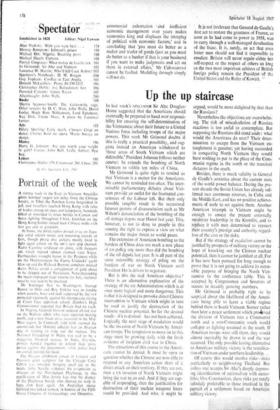Up the up staircase
In last week's SPECTATOR Sir Alec Douglas:. Home suggested that the Americans should eventually be prepared to hand over responsi- bility for ensuring the self-determination of the Vietnamese about their future to a United Nations force including troops of the major powers. This week Mr Grimond doubts if this is really a practical possibility, and sug- gests instead an American withdrawal to 'those areas of South Vietnam which are defensible.' President Johnson follows neither course : he extends the bombing of North Vietnam to within ten miles of China.
Mr Grimond is quite right to remind us that Vietnam is a matter for the Americans. We cannot be reminded too often. The inter- minable parliamentary debates about Viet- nam provide an outlet for the frustrated. con- sciences of the Labour left. But their, only possible tangible result is the occasional fatuous gesture of disassociation such as Mr Wilson's denunciation of the bombing of the oil storage depots near Hanoi last year. This, however, is not to deny to people in this country the right to express a view on what remains the major threat to world peace.
The extension of American bombing to the borders of China does not mark a new phase of us policy any more than did the bombing of the oil depots last year. It is all part of the same ostensible strategy of piling on the burdens of war on North Vietnam until President Ho is driven to negotiate.
But is this the real American objective? There is an alternative explanation of the strategy of the us Administration which is at once more logical and more dangerous. This is that it is designed to provoke direct Chinese intervention in Vietnam which might in turn be used to justify the destruction of the Chinese nuclear potential. So far the desired result—if it is desired- has not been achieved. Logically the next stage of escalation would be the invasion of North Vietnam by Ameri- can troops. The temptation to move on to this stage must be growing daily with the fresh evidence of incipient civil war in China.
The attractions of this course to the Ameri- cans cannot be denied. It must be open to question whether the Chinese are now able to respond to any American action short of if direct attack on their territory. If they are not, then a Us itwasion of North Vietnam might bring the war to an end. And if they are cap- able of :responding, then the justification far destruction. of their nuclear weapons bases would be provided. And who, it might be argued, would be more delighted by that than the RnsSianS? Islevertheless the objections are overwhelm- ing. The risk of miscalculation of Russian reactions is too awful to contemplate. But supposing the Russians did stand aside: what would the Americans do next? Their deter- mination to escape from the Vietnam .en- tanglement is genuine; yet having succeeded in conquering North Vietnam they would have nothing to put in the place of the COM: munist regime in the north or the transient dictators in the south.
Besides, there is much validity in General de Gaulle's anxieties about the current state of the world power balance. During the pre- sent decade the Soviet Union has already suf- ferred two enormous reverses, in Cuba and the Middle East, and has no positive achieve- ments Of scale to set against them. Another American triumph in Vietnam might be enough to unseat the present externally moderate leadership in the Kremlin,, and to replace it with men determined to reassert their country's prestige and authority regard- less of the cost or the risks.
But if the strategy of escalation cannot be justified by prospects of military victory or the hope of knocking out the Chinese nuclear potential, then it cannot be justified at all. For it has now been pursued for long enough to prove that it is not going to achieve its osten- sible purpose of bringing the North Viet- namese to the conference table. This IS accepted by Congressmen and Senators of stature in steadily growing numbers.
Mr Grimond is probably right to be sceptical about the likelihood of the Ameri- cans being able to leave a viable regime behind them in South Vietnam. Sooner rather than later a peace settlement which prehrved the division of Vietnam into a Communist north and a non-Communist south would collapse as fighting resumed in the south. If American troops were still there, they would almost inevitably be drawn in and the war resumed. The only possible lasting alternative to-American military victory is the reunifica- t ion of Vietnam under northern leadership. _- Of' course this would involve -risks--risks particularly to neighbouring Thailand. But unless one accepts Sir Alee's deeply .depress- ing identification of nationalism with mono- lithic bloc Communism, these risks are surely infinitely preferable to those involved in the PitrStlit of a settlement based on American military victory.






























 Previous page
Previous page